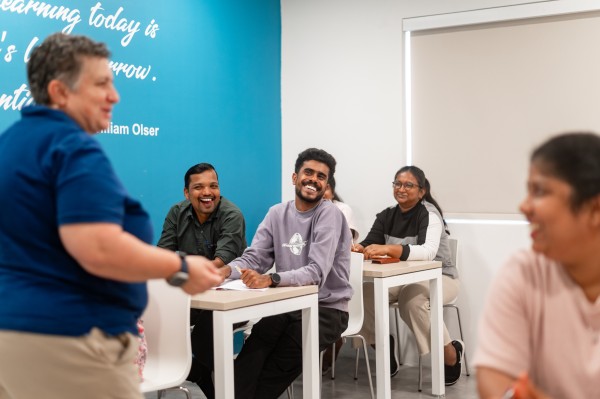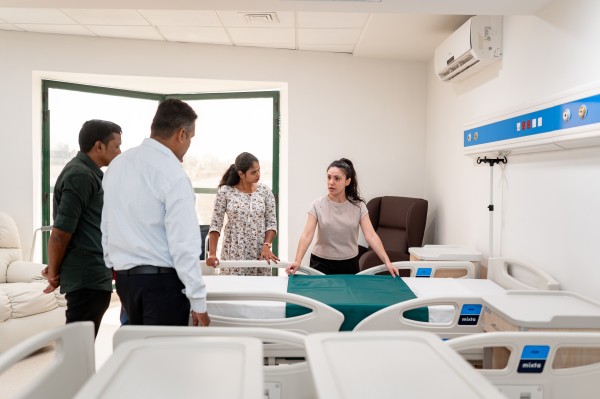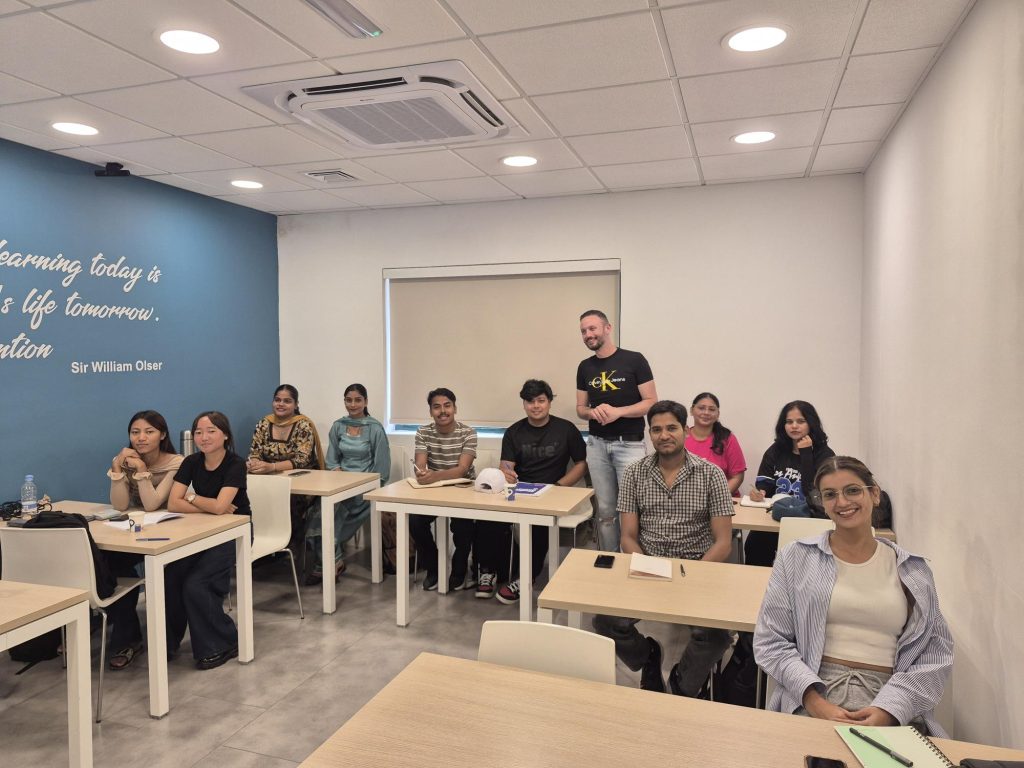
This CPD award is designed to provide nurses with a comprehensive understanding of applied anatomy and physiology relevant to their practice. Through lectures, discussions, and practical demonstrations, participants will gain insight into the structure and function of the human body, enabling them to comprehend better the implications of health conditions, medical interventions, and nursing care.
This is a comprehensive CPD award designed to provide participants with a deep understanding of the structure and function of the human body. Participants will explore the intricacies of the various systems within the body, including the skeletal, muscular, cardiovascular, respiratory, digestive, and nervous systems. They will consolidate their knowledge about the anatomical structures of the body, including bones, muscles, organs, and tissues, as well as their physiological functions and how they interact with one another to maintain homeostasis.
Emphasis will be placed on the relationship between structure and function, and how disruptions in these systems can lead to various health conditions. By the end of the unit, students will have strengthened their understanding of anatomy and physiology, enabling them to effectively assess, diagnose, and treat patients in a healthcare setting. This unit is essential for nurses as it provides them with the necessary knowledge and skills to deliver high-quality patient care based on a thorough understanding of the human body.

This is a 60 ECTS credit programme of studies, during which the learner becomes better acquainted with becoming a Childcare Educator. Amongst other themes, lectures deal with Child Development, Children’s Rights, Positive Relationships, Child-Centred and Play-Based Pedagogy, Physical Development, Diversity Inclusive Early Childhood Education and Care, Working in Partnership with Parents.
Lecturers deliver engaging presentations which are thought-provoking to allow course participants to be prepared to work in Childcare Centres. A work-based learning component is included as part of this programme. Healthmark is a firm believer in the many benefits of Work-based Learning and will adhere to the MFHEA document available online at:
https://mfhea.mt/wp-content/uploads/2023/09/MFHEA-Guidelines-for-QA-of-WBL.pdf

This programme aims to equip nurses with the linguistic tools necessary to communicate effectively in various healthcare settings. Topics covered include patient assessment, treatment procedures, medication administration, patient education, healthcare documentation, and inter-professional communication. Emphasis is placed on practical communication skills essential for nursing practice, including greeting patients, providing instructions, offering reassurance, and conveying empathy.
This will be achieved by foregrounding the following communicative skills: Greeting and everyday general conversations, Clarification, Politeness, Empathy, Instructions, Advice and Problems related to the body.

In health and social care settings, documentation plays a crucial role in ensuring the delivery of high-quality and effective care to individuals. This course will explore the importance of accurate and thorough documentation in maintaining patient safety, continuity of care, and legal compliance. Course Participants will learn how to effectively record and communicate essential information such as patient assessments, treatment plans, and medication administration.
Additionally, the course will cover the significance of confidentiality and data protection in documentation practices, emphasizing the need to maintain privacy and security of sensitive information. Course Participants will also be introduced to various documentation formats and systems commonly used in health and social care settings, including electronic health records and paper-based charts. Through case studies and practical exercises, students will develop the skills necessary to document information accurately, concisely, and in a timely manner.
By the end of the course, participants will have a comprehensive understanding of the role of documentation in promoting safe and effective care delivery in health and social care settings.

This CPD training explores the intersection of law and sociology within the context of nursing practice. Course participants will delve into the legal framework governing healthcare delivery, focusing on key legislation and regulations that guide nursing professionals. Through a sociological lens, students will examine the impact of social determinants of health, cultural diversity, and healthcare disparities on patient outcomes.
The award will also cover topics such as patient rights, confidentiality, informed consent, and professional boundaries in nursing practice. Participants will develop critical thinking skills to analyse social issues and legal issues that arise in healthcare settings. By exploring the societal factors influencing healthcare delivery, participants will gain a deeper understanding of the broader implications of nursing practice on individuals and communities. Through case studies, discussions, and practical applications, students will be equipped to navigate the legal and sociological complexities of nursing practice with professionalism and ethical integrity.

This programme aims to equip Care Workers with the linguistic tools necessary to communicate effectively in various healthcare settings. Topics covered include medication administration, patient education, healthcare documentation, and inter-professional communication. This will be achieved by exposing learners to the fundamental building blocks that enable effective communication in the following areas:
- Routine dealings with patient and colleagues
- Nutrition
- Medical supplies
- Matters related to the body and hygiene
- Accidents and emergencies
- Therapeutic regimes and general healthcare
This will be achieved by foregrounding the following communicative skills, by learning the language of:
- Greeting and everyday general conversations
- Clarification
- Politeness
- Empathy
- Instructions
- Advice
- Problems related to the body.

This English course provides the terminology and skills required to define fundamental topics of medicine, such as:
- Dealing with colleagues and patients
- Nutrition and the body
- Accidents and emergencies
- Vocabulary for medication, pills and general healthcare
- Medical supplies
In addition to the above, a particular focus of this training is communication at the workplace. Every subject is covered in detail, from greeting people, using small talk to active listening.
- Functional English/ role plays
- Greetings and everyday conversations
- Politeness and clarification
- Dealing with problems
- Giving instructions
- Giving advice

This English course provides the terminology and skills required to define fundamental topics of medicine, such as:
- Dealing with colleagues and patients
- Nutrition and the body
- Accidents and emergencies
- Vocabulary for medication, pills and general healthcare
- Medical supplies
In addition to the above, a particular focus of this training is communication at the workplace. Every subject is covered in detail, from greeting people, using small talk to active listening.
- Functional English/ role plays
- Greetings and everyday conversations
- Politeness and clarification
- Dealing with problems
- Giving instructions
- Giving advice

This programme aims to equip hospitality employees with the linguistic tools necessary to communicate effectively in various settings. Topics covered include language related to:
- Health and safety at the workplace
- Preparation of different areas for service
- Maintaining colleague and management relations
- Post service cleaning and clearing of specific areas
- Workplace standard procedures
- Guest relations and customer service
- Transactions and cash management
Emphasis is placed on practical communication skills essential for nursing practice, including greeting patients, providing instructions, offering reassurance, and conveying empathy.
This will be achieved by foregrounding the following communicative skills: Greeting and everyday general conversations, Clarification, Politeness, Empathy, Instructions and Advice.








